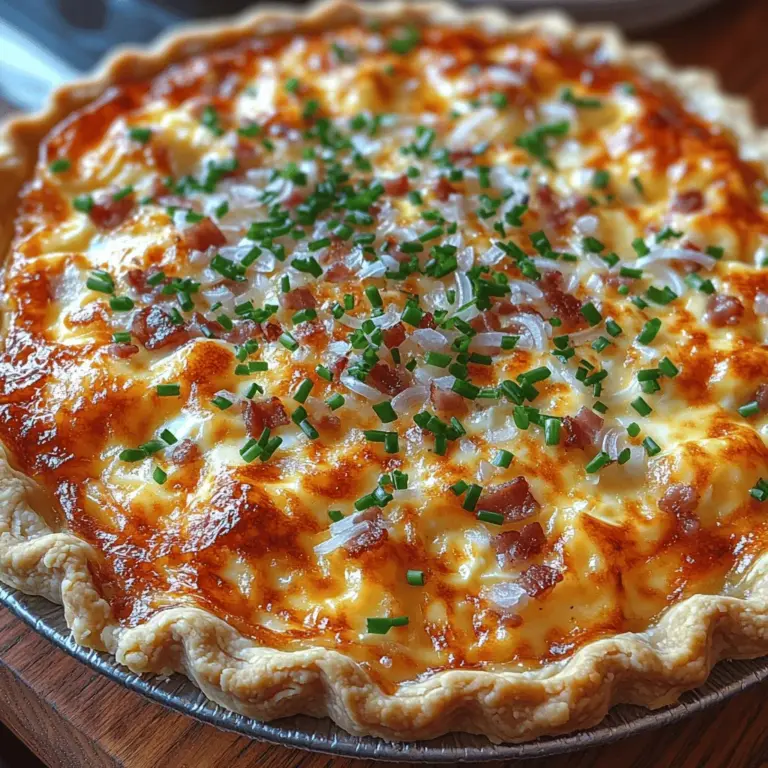Discover the delightful world of Quiche Lorraine, a classic French dish that has won hearts and taste buds around the globe. This savory pie, known for its rich filling and flaky crust, is perfect for brunch, lunch, or even a light dinner. Its origins can be traced back to the region of Lorraine in northeastern France, where it was initially a simple dish made with cream and eggs. Over the years, this dish has evolved into a culinary favorite, celebrated for its versatility and rich flavor profile. In this article, we will explore the origins of Quiche Lorraine, the essential ingredients that make it special, and provide a detailed step-by-step guide to creating your own Quiche Lorraine Delight at home. Whether you’re a seasoned chef or a cooking novice, this recipe is sure to impress your family and friends.
The Rich History of Quiche Lorraine
Understanding the Origins of Quiche Lorraine
The history of Quiche Lorraine is deeply rooted in the culinary traditions of Lorraine, a region known for its hearty and flavorful dishes. The term “quiche” itself is derived from the German word “kuchen,” which means cake. Originally, Quiche Lorraine was a simple dish comprising a pastry crust filled with eggs, cream, and bacon, reflecting the region’s agricultural bounty. The earliest known recipes date back to the 16th century, though it wasn’t until the 19th century that the dish began to gain popularity outside of France.
Over time, culinary influences from neighboring countries allowed the dish to evolve. The incorporation of cheese, particularly Gruyère, transformed Quiche Lorraine into the rich, creamy version we enjoy today. This adaptation not only enhanced the flavor but also reflected the ingredients available to local chefs and home cooks. As French cuisine gained prominence worldwide, Quiche Lorraine became synonymous with brunch and sophisticated dining, adored by food lovers everywhere.
Exploring the Traditional Ingredients of Quiche
At its core, Quiche Lorraine is a celebration of simple yet high-quality ingredients. The traditional recipe includes a few key components that work harmoniously to create a delightful dish. The classic ingredients include:
1. Pie Crust: A flaky, buttery crust serves as the foundation, enveloping the rich filling.
2. Eggs: The main binding agent that provides structure and a delicate texture.
3. Heavy Cream: Adds creaminess and depth to the filling.
4. Gruyère Cheese: A Swiss cheese known for its nutty flavor and excellent melting qualities.
5. Bacon: Crispy bacon lardons add a savory, salty element that enhances the overall flavor.
6. Onions: Sautéed onions bring a touch of sweetness and complexity to the filling.
7. Seasonings: A pinch of nutmeg, salt, and pepper round out the flavors.
While these ingredients are traditional, many cooks have put their own spin on the recipe, incorporating vegetables, herbs, or even different types of cheese. This adaptability has contributed to the dish’s enduring popularity and its place in kitchens around the world.
Quiche Lorraine in Modern Cuisine
Today, Quiche Lorraine has transcended its humble beginnings to become a staple in modern cuisine. Its versatility allows it to be served at any meal of the day, making it a favorite for brunch gatherings, picnics, and family dinners alike. Chefs and home cooks alike have embraced the quiche as a canvas for creativity, experimenting with various fillings and flavor combinations.
From adding fresh vegetables like spinach and tomatoes to experimenting with different cheeses, the possibilities are endless. Moreover, the quiche can be made gluten-free or vegetarian, catering to diverse dietary preferences. This adaptability ensures that Quiche Lorraine remains relevant in today’s culinary landscape, appealing to traditionalists and innovators alike.
Essential Ingredients for Quiche Lorraine Delight
Creating a perfect Quiche Lorraine Delight begins with understanding the essential ingredients that contribute to its unique flavor and texture. Below is an overview of the key ingredients you will need:
Pre-made Pie Crust: Convenience Meets Quality
While some may choose to make their pie crust from scratch, using a pre-made pie crust can save time and effort without sacrificing quality. A good quality store-bought crust provides a flaky and delicious base for your quiche, allowing you to focus on perfecting the filling.
Eggs: The Heart of the Quiche
Eggs are the foundation of any quiche, providing structure and richness. For the best results, use large eggs, as they contribute to the overall volume of the filling. The eggs should be fresh, as their flavor and quality greatly impact the final dish.
Dairy: Heavy Cream vs. Whole Milk
When it comes to the creamy filling of Quiche Lorraine, the choice between heavy cream and whole milk is crucial. Heavy cream results in a richer, more decadent quiche, while whole milk will yield a lighter version. Many recipes combine both for a balance of creaminess and texture.
Cheese: The Role of Gruyère in Flavor
Gruyère cheese is the traditional choice for Quiche Lorraine, adding a wonderful nutty flavor and creamy texture. This Swiss cheese melts beautifully and compliments the other ingredients perfectly. If Gruyère is unavailable, you can substitute it with Emmental or a sharp cheddar for a different taste experience.
Bacon: Adding Savory Depth
Crispy bacon lardons are essential for achieving the authentic flavor of Quiche Lorraine. The salty, savory notes of the bacon enhance the richness of the eggs and cream, creating a harmonious blend of flavors. For a vegetarian option, consider using sautéed mushrooms or smoked tempeh as a substitute.
Onions and Seasonings: Building Flavor Complexity
Sautéed onions are a key ingredient in Quiche Lorraine, providing sweetness and depth. You can use yellow or white onions, finely chopped and sautéed until translucent. Seasoning is just as important; a pinch of nutmeg, salt, and freshly ground black pepper will elevate the flavors and add warmth.
Step-by-Step Guide to Making Quiche Lorraine Delight
Creating your Quiche Lorraine Delight at home involves several key steps that ensure a delicious outcome. Below is a detailed guide to help you navigate the process.
Preparing the Oven and Pie Crust
Before you begin assembling your quiche, it’s essential to prepare your oven and pie crust properly.
Importance of Preheating the Oven
Start by preheating your oven to 375°F (190°C). Preheating is crucial because it ensures that the quiche bakes evenly, resulting in a perfectly cooked filling and a golden-brown crust. An oven thermometer can help ensure your oven is at the correct temperature.
Techniques for Preparing the Pie Crust
If you are using a pre-made pie crust, remove it from the packaging and place it in a 9-inch pie dish, gently pressing it into the edges. If you prefer a homemade crust, roll out the dough on a lightly floured surface and transfer it to the pie dish. Crimp the edges for a decorative touch. To prevent the crust from puffing up during baking, you can blind bake it by lining it with parchment paper and filling it with pie weights or dried beans. Bake for about 10-15 minutes until lightly golden.
Sautéing the Onions
The next step in preparing your Quiche Lorraine is to sauté the onions, which will enhance their natural sweetness.
Why Sautéing is Essential for Flavor
Sautéing onions brings out their complex flavors, transforming them from sharp and pungent to sweet and savory. Cooking them until they are soft and translucent will help build a solid flavor base for your quiche.
Tips for Perfectly Cooking Onions
To sauté onions, heat a tablespoon of olive oil or butter in a skillet over medium heat. Add the finely chopped onions and stir occasionally, cooking until they are soft and lightly caramelized, about 5-7 minutes. Be careful not to burn them; if they begin to brown too quickly, reduce the heat. Once cooked, remove the skillet from the heat and set the onions aside to cool slightly.
Mixing the Filling
With the crust prepared and the onions sautéed, it’s time to mix the filling for your Quiche Lorraine Delight.
Proper Techniques for Whisking Eggs and Dairy
In a large mixing bowl, crack the eggs and whisk them together until well combined. For a standard quiche, use 3 to 4 large eggs. Next, add in your choice of dairy—whether it’s heavy cream, whole milk, or a combination of both. A good ratio is approximately 1 cup of dairy for every 3 eggs. Season the mixture with salt, pepper, and a pinch of nutmeg, whisking until smooth.
Incorporating the Remaining Ingredients
Once the egg and dairy mixture is well-blended, fold in the sautéed onions, crispy bacon, and grated Gruyère cheese. Ensure the ingredients are evenly distributed throughout the filling. This step is crucial, as it ensures each slice of your Quiche Lorraine Delight is packed with flavor.
With these steps completed, you are well on your way to creating a delicious Quiche Lorraine Delight that will impress anyone who has the pleasure of tasting it. In the next part of this article, we will cover the final steps of assembling and baking your quiche, as well as some helpful tips for achieving the perfect texture and flavor. Stay tuned for the continuation of this culinary adventure!
{{image_1}}
Incorporating Ingredients for a Uniform Mixture
Once you have prepared your crust and your filling ingredients are ready, it’s time to create a delightful mixture that will infuse your Quiche Lorraine with flavor and texture. Start by whisking together the eggs and heavy cream in a large mixing bowl. This combination is fundamental; it not only binds the ingredients but also creates that luscious, custardy texture that defines a perfect quiche.
Next, season the egg and cream mixture with salt, pepper, and a pinch of nutmeg. Nutmeg may seem atypical, but it adds depth to the flavor profile. Stir in the cooked bacon and grated cheese, ensuring each piece is evenly coated in the mixture. The key here is to achieve a uniform distribution, so every slice of your quiche offers the same exquisite taste.
Filling the Crust and Baking
Techniques for Pouring and Spreading the Filling
With your crust pre-baked and slightly cooled, it’s time to assemble the quiche. Carefully pour the egg mixture into the crust. To ensure an even filling, start at the center and let the mixture flow towards the edges. This technique minimizes splashing and helps prevent air bubbles from forming.
If you notice any air pockets, gently lift the crust and tap it on the counter to release them. Once the filling is in, you can use a spatula to spread it evenly if needed. The filling should come just to the rim of the crust, allowing space for it to puff up slightly during baking.
Baking Tips for Achieving Perfect Texture
Preheat your oven to 375°F (190°C). Place your quiche on a baking sheet to catch any drips, and then transfer it to the oven. Bake for 30-35 minutes, or until the filling is set and the top is golden brown. Keep an eye on it during the last few minutes; ovens can vary, and you want to avoid over-baking, which can lead to a rubbery texture.
To check for doneness, gently shake the quiche; it should have a slight jiggle in the center but should not be liquid. If the top is browning too quickly, cover it loosely with aluminum foil. Once baked, remove the quiche from the oven and let it rest for about 10-15 minutes before serving. This cooling period allows the filling to firm up and makes slicing easier.
Cooling and Serving the Quiche
The Importance of Cooling Before Slicing
Cooling your quiche before slicing is an essential step that ensures clean cuts and a well-set filling. If you slice into it while it’s still hot, the filling may spill out, resulting in a messy presentation. Allowing it to cool also enhances the flavors, as they have time to meld together.
After the resting period, use a sharp knife to cut your quiche into wedges. Serve it warm or at room temperature, as it maintains its flavor beautifully even when cooled.
Presentation Ideas for Serving
Presentation plays a vital role in any dish, and Quiche Lorraine is no exception. To elevate your serving game, consider these ideas:
– Garnish: Fresh herbs like chives or parsley add a pop of color and freshness. Arrange them on top of each slice for a professional touch.
– Serving Platter: Use a rustic wooden board or a colorful ceramic platter to serve the quiche. This enhances the visual appeal and invites guests to help themselves.
– Accompaniments: Serve your quiche alongside a light salad or a simple vinaigrette to balance the richness.
Nutritional Information of Quiche Lorraine Delight
Caloric Breakdown of Ingredients
Understanding the nutritional profile of your Quiche Lorraine can help you enjoy it guilt-free. A typical serving of Quiche Lorraine (1 slice) contains approximately:
– Calories: 350-400
– Protein: 12-15 grams
– Carbohydrates: 30 grams
– Fat: 25 grams
The exact caloric content can vary based on the specific ingredients and portion sizes.
Health Benefits of Key Ingredients
Quiche Lorraine offers several health benefits from its main ingredients:
– Eggs: Packed with protein and essential vitamins, eggs support muscle health and provide energy.
– Bacon: While higher in fat, bacon also contributes protein and flavor. Opting for turkey bacon can reduce fat content.
– Cheese: Rich in calcium and protein, cheese adds not only flavor but also nutritional value.
Serving Size and Recommended Portions
For a balanced meal, consider serving one slice of Quiche Lorraine alongside a side salad or steamed vegetables. This combination provides a variety of nutrients and keeps the meal light yet satisfying.
Variations and Customizations of Quiche Lorraine
Exploring Other Cheese Options
While traditional Quiche Lorraine features Gruyère cheese, feel free to explore other cheese options for different flavor profiles. Cheddar, feta, or goat cheese can all work beautifully, each adding its unique twist to this classic dish.
Adding Vegetables for a Healthier Twist
Incorporating vegetables into your quiche not only enhances its nutritional value but also adds color and texture. Spinach, mushrooms, or bell peppers can be sautéed and mixed into the filling. This is a great way to sneak in some extra greens for a healthy twist.
Substituting Meats: Ham, Sausage, or Vegetables
If you’re seeking alternatives to the traditional bacon, consider diced ham or cooked sausage for a different flavor. Vegetarians can replace meat with ingredients like artichokes, zucchini, or sun-dried tomatoes, making the dish suitable for a variety of diets.
Gluten-Free Options for the Crust
For those who are gluten intolerant, creating a gluten-free quiche is easy. Substitute the traditional crust with a gluten-free pie crust or make a crustless version by simply greasing the pan and pouring the filling directly into it. This also reduces preparation time.
The Perfect Pairings for Quiche Lorraine
Ideal Side Dishes to Complement Your Quiche
Pairing your Quiche Lorraine with the right side dishes enhances the overall dining experience. Light salads, such as a mixed greens salad with a citrus vinaigrette, balance the richness of the quiche. Roasted vegetables or a simple ratatouille can also offer a delicious contrast.
Beverage Suggestions: Wine, Coffee, and More
When it comes to beverages, consider serving a crisp white wine like Sauvignon Blanc or a light-bodied red such as Pinot Noir. If you prefer non-alcoholic options, iced tea or a refreshing lemonade can cleanse the palate beautifully.
Seasonal Salads That Enhance the Meal
Seasonal salads can add freshness to your meal. In the summer, a tomato and basil salad pairs wonderfully with Quiche Lorraine, while in the fall, a roasted beet and arugula salad can bring out the earthiness of the dish.
Conclusion: Enjoying Your Quiche Lorraine Delight
Homemade cooking offers a unique joy, and mastering Quiche Lorraine can be a rewarding experience. This dish is not only versatile but also allows for creativity in the kitchen. Whether you’re preparing it for a festive brunch, a casual family dinner, or a sophisticated gathering, Quiche Lorraine will impress your guests and satisfy your taste buds.
Embrace the process of experimentation—try different ingredients, flavors, and serving styles. The beauty of quiche lies in its adaptability, making it a favorite for any occasion. So roll up your sleeves, gather your ingredients, and enjoy the delightful journey of creating your very own Quiche Lorraine Delight.



